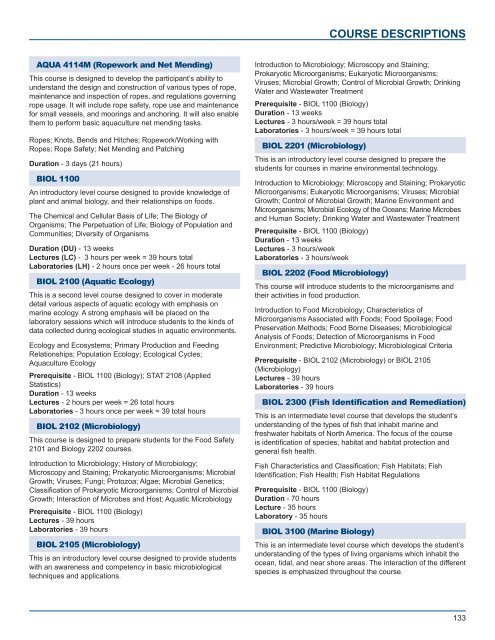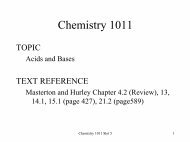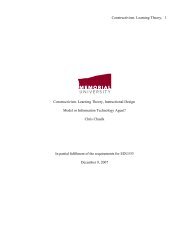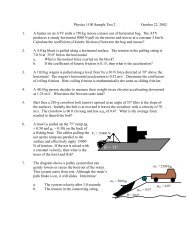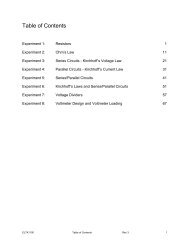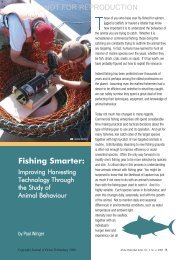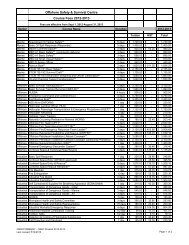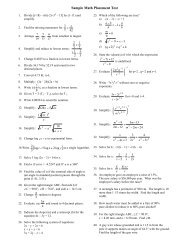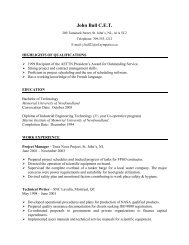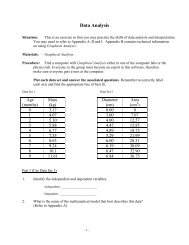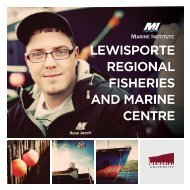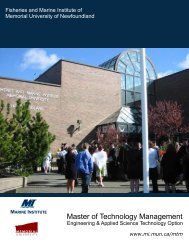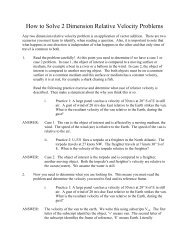Academic Calendar - Fisheries and Marine Institute - Memorial ...
Academic Calendar - Fisheries and Marine Institute - Memorial ...
Academic Calendar - Fisheries and Marine Institute - Memorial ...
You also want an ePaper? Increase the reach of your titles
YUMPU automatically turns print PDFs into web optimized ePapers that Google loves.
COURSE DESCRIPTIONS<br />
AQUA 4114M (Ropework <strong>and</strong> Net Mending)<br />
This course is designed to develop the participant’s ability to<br />
underst<strong>and</strong> the design <strong>and</strong> construction of various types of rope,<br />
maintenance <strong>and</strong> inspection of ropes, <strong>and</strong> regulations governing<br />
rope usage. It will include rope safety, rope use <strong>and</strong> maintenance<br />
for small vessels, <strong>and</strong> moorings <strong>and</strong> anchoring. It will also enable<br />
them to perform basic aquaculture net mending tasks.<br />
Ropes; Knots, Bends <strong>and</strong> Hitches; Ropework/Working with<br />
Ropes; Rope Safety; Net Mending <strong>and</strong> Patching<br />
Duration - 3 days (21 hours)<br />
BIOL 1100<br />
An introductory level course designed to provide knowledge of<br />
plant <strong>and</strong> animal biology, <strong>and</strong> their relationships on foods.<br />
The Chemical <strong>and</strong> Cellular Basis of Life; The Biology of<br />
Organisms; The Perpetuation of Life; Biology of Population <strong>and</strong><br />
Communities; Diversity of Organisms<br />
Duration (DU) - 13 weeks<br />
Lectures (LC) - 3 hours per week = 39 hours total<br />
Laboratories (LH) - 2 hours once per week - 26 hours total<br />
BIOL 2100 (Aquatic Ecology)<br />
This is a second level course designed to cover in moderate<br />
detail various aspects of aquatic ecology with emphasis on<br />
marine ecology. A strong emphasis will be placed on the<br />
laboratory sessions which will introduce students to the kinds of<br />
data collected during ecological studies in aquatic environments.<br />
Ecology <strong>and</strong> Ecosystems; Primary Production <strong>and</strong> Feeding<br />
Relationships; Population Ecology; Ecological Cycles;<br />
Aquaculture Ecology<br />
Prerequisite - BIOL 1100 (Biology); STAT 2108 (Applied<br />
Statistics)<br />
Duration - 13 weeks<br />
Lectures - 2 hours per week = 26 total hours<br />
Laboratories - 3 hours once per week = 39 total hours<br />
BIOL 2102 (Microbiology)<br />
This course is designed to prepare students for the Food Safety<br />
2101 <strong>and</strong> Biology 2202 courses.<br />
Introduction to Microbiology; History of Microbiology;<br />
Microscopy <strong>and</strong> Staining; Prokaryotic Microorganisms; Microbial<br />
Growth; Viruses; Fungi; Protozoa; Algae; Microbial Genetics;<br />
Classification of Prokaryotic Microorganisms; Control of Microbial<br />
Growth; Interaction of Microbes <strong>and</strong> Host; Aquatic Microbiology<br />
Prerequisite - BIOL 1100 (Biology)<br />
Lectures - 39 hours<br />
Laboratories - 39 hours<br />
BIOL 2105 (Microbiology)<br />
This is an introductory level course designed to provide students<br />
with an awareness <strong>and</strong> competency in basic microbiological<br />
techniques <strong>and</strong> applications.<br />
Introduction to Microbiology; Microscopy <strong>and</strong> Staining;<br />
Prokaryotic Microorganisms; Eukaryotic Microorganisms;<br />
Viruses; Microbial Growth; Control of Microbial Growth; Drinking<br />
Water <strong>and</strong> Wastewater Treatment<br />
Prerequisite - BIOL 1100 (Biology)<br />
Duration - 13 weeks<br />
Lectures - 3 hours/week = 39 hours total<br />
Laboratories - 3 hours/week = 39 hours total<br />
BIOL 2201 (Microbiology)<br />
This is an introductory level course designed to prepare the<br />
students for courses in marine environmental technology.<br />
Introduction to Microbiology; Microscopy <strong>and</strong> Staining; Prokaryotic<br />
Microorganisms; Eukaryotic Microorganisms; Viruses; Microbial<br />
Growth; Control of Microbial Growth; <strong>Marine</strong> Environment <strong>and</strong><br />
Microorganisms; Microbial Ecology of the Oceans; <strong>Marine</strong> Microbes<br />
<strong>and</strong> Human Society; Drinking Water <strong>and</strong> Wastewater Treatment<br />
Prerequisite - BIOL 1100 (Biology)<br />
Duration - 13 weeks<br />
Lectures - 3 hours/week<br />
Laboratories - 3 hours/week<br />
BIOL 2202 (Food Microbiology)<br />
This course will introduce students to the microorganisms <strong>and</strong><br />
their activities in food production.<br />
Introduction to Food Microbiology; Characteristics of<br />
Microorganisms Associated with Foods; Food Spoilage; Food<br />
Preservation Methods; Food Borne Diseases; Microbiological<br />
Analysis of Foods; Detection of Microorganisms in Food<br />
Environment; Predictive Microbiology; Microbiological Criteria<br />
Prerequisite - BIOL 2102 (Microbiology) or BIOL 2105<br />
(Microbiology)<br />
Lectures - 39 hours<br />
Laboratories - 39 hours<br />
BIOL 2300 (Fish Identification <strong>and</strong> Remediation)<br />
This is an intermediate level course that develops the student’s<br />
underst<strong>and</strong>ing of the types of fish that inhabit marine <strong>and</strong><br />
freshwater habitats of North America. The focus of the course<br />
is identification of species, habitat <strong>and</strong> habitat protection <strong>and</strong><br />
general fish health.<br />
Fish Characteristics <strong>and</strong> Classification; Fish Habitats; Fish<br />
Identification; Fish Health; Fish Habitat Regulations<br />
Prerequisite - BIOL 1100 (Biology)<br />
Duration - 70 hours<br />
Lecture - 35 hours<br />
Laboratory - 35 hours<br />
BIOL 3100 (<strong>Marine</strong> Biology)<br />
This is an intermediate level course which develops the student’s<br />
underst<strong>and</strong>ing of the types of living organisms which inhabit the<br />
ocean, tidal, <strong>and</strong> near shore areas. The interaction of the different<br />
species is emphasized throughout the course.<br />
133


